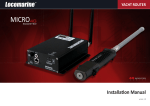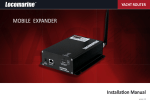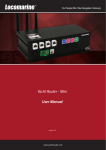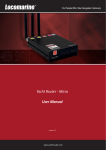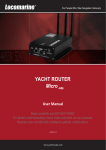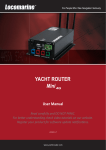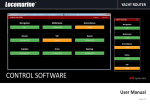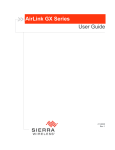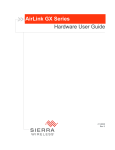Download Installation Manual - Locomarine
Transcript
YACHT ROUTER Installation Manual version 1.0 YACHT ROUTER Read carefully. For better understanding check video tutorials on our website. Register your product for software update notifications. Thank you. 2 YACHT ROUTER Contents 1. 2. 3. 4. 5. 6. 7. 8. 9. 10. 10.1. 10.2. 10.3. 10.4. 10.5. 10.6. 10.7. 10.8. 11. 12. 13. 13.1. 13.2. 13.3. 13.4. 13.5. 13.6. 13.7. 13.8. 14. 15. 16. 17. 18. 19. COPYRIGHT NOTICE ...........4 RoHS COMPLIANT ...........4 INTRODUCING YACHT ROUTER SOLUTION ...........4 DISCLAIMER AND WARNING ...........4 SAFETY AND HAZARD ...........5 SAFETY INSTRUCTIONS ...........6 ABOUT YACHT ROUTER STANDARD ...........7 MODEL VERSIONS ...........7 FEATURES ...........8 SPECIFICATIONS ...........8 WAN, LAN, Backbone networks ...........8 Extenders, Expanders, Controller support ...........8 Vessel-to-Shore WIFI booster ...........8 Client-to-Vessel WIFI ...........9 Mobile network ...........9 Power, environment and dimensions ...........9 Software features ...........9 Cloud Service ...........9 WHAT IS IN THE PACKAGE ...........10 YACHT ROUTER STANDARD INTRODUCTION ...........11 INSTALLATION INSTRUCTIONS ...........12 Connecting Vessel-to-Shore WIFI Booster ...........13 Connecting antenna to WIFI Booster ...........15 Connecting WIFI Booster to Yacht Router ...........16 Connecting WIFI and Mobile antennas to Yacht Router ...........17 Connecting power supply and inserting SIM card to Yacht Router ...........19 Connecting satellite or other WAN source to Yacht Router Standard ...........20 Connecting Ethernet TCP/IP equipment to Yacht Router Standard ...........20 Properly connected Yacht Router Standard system ...........21 NETWORK DETAILS ...........22 HOW TO RECONFIGURE VESSEL NETWORK PORTS ...........23 LOCOMARINE LIMITED FACTORY WARRANTY ...........23 DECLARATION OF CONFORMITY ...........23 FCC INTERFERENCE STATEMENT ...........23 INDUSTRY CANADA NOTICE TO USERS ...........24 3 YACHT ROUTER 1.COPYRIGHT NOTICE Locomarine d.o.o. reserves the rights to alter the products described in this manual at any time without prior notice. This document contains proprietary information protected by copyright. All rights are reserved. No part of this manual may be reproduced by any mechanical, electronic, or other means in any form without prior written permission of the manufacturer. Information provided in this manual is intended to be accurate and reliable. However, Locomarine d.o.o. assumes no responsibility for use of this manual, nor for any infringements upon the rights of third parties, which may result from such use. 2.RoHS COMPLIANT All models in the Yacht Router series comply with the Restriction of Hazardous Materials (RoHS) Directive. This means that all components used to build Yacht Router are RoHS compliant. The RoHS Directive bans placing on the EU market new electrical and electronic equipment containing more than agreed levels of lead, cadmium, mercury, hexavalent chromium, polybrominated biphenyl (PBB) and polybrominated diphenyl ether (PBDE) flame retardants. 3.INTRODUCING YACHT ROUTER SOLUTION Yacht Router is a complete network infrastructure solution for yacht or boat of any size. Yacht Router devices will help you to easily install, setup and control Internet connection on your yacht. The most important part of Yacht Router solution is the software which controls complete system. It is designed by professionals specialized in yacht communication systems in collaboration with experienced yacht captains. The result is a system that is simple to operate, maintain and control. Underneath simple touch user interface, Yacht Router is a solution with an industry level of reliability, performance and unprecedented level of security. 4.DISCLAIMER AND WARNING The contents of this manual are well prepared by Locomarine d.o.o. While we try to improve our equipment at all times, Locomarine d.o.o. shall incur no liability based on contents, updates or modification of the contents, or the lack of contents in this manual. Because of the nature of wireless communications, transmission and reception of data can never be guaranteed. Data may be delayed, corrupted (i.e, have errors) or be totally lost. Although significant delays or losses of data are rare when wireless devices such as the Yacht Router are used in a normal manner with a well-constructed network, the Yacht Router device should not be used in situations where failure to transmit or receive data could result in damage of any kind to the user or any other party, including but not limited to personal injury, death, or loss of property. Locomarine d.o.o. and its affiliates accept no responsibility for damage of any kind resulting from delays or errors in data transmitted or received using the Yacht Router device, or for failure of the Yacht Router device to transmit or receive such data. The equipment said in this manual must only be used for what it was designed. Improper operation or installation may cause damage to the equipment or personal injury. Locomarine d.o.o. will not incur any liability of equipment damage or personal injury due to improper use or installation of the equipment. It is strongly recommended to read this manual and the following safety instructions before proceeding to installation or operation. 4 YACHT ROUTER 5.SAFETY AND HAZARD Do not operate your Yacht Router: • • • In areas where blasting is in progress. Where explosive atmospheres may be present including refuelling points, fuel depots, and chemical plants. Near medical equipment, life support equipment, or any equipment which may be susceptible to any form of radio interference. In such areas, the Yacht Router MUST BE POWERED OFF. Otherwise, the Yacht Router can transmit signals that could interfere with this equipment. In an aircraft, the Yacht Router MUST BE POWERED OFF. Otherwise, the Yacht Router can transmit signals that could interfere with various on-board systems and may be dangerous to the operation of the aircraft or disrupt the cellular network. Use of cellular and WIFI equipment in an aircraft is illegal in some jurisdictions. Failure to observe this instruction may lead to suspension or denial of cellular services to the offender, or legal action or both. Some airlines may permit the use of cellular phones while the aircraft is on the ground and the door is open. The Yacht Router may be used normally at this time. IMPORTANT: Exposure to Radio Frequency Radiation. 63 cm minimum distance has to be maintained between the antenna and the occupational user and 142 cm to general public. Under such configuration, the FCC radiation exposure limits set forth for an population/uncontrolled environment can be satisfied. List of approved antennas: Omni Directional (pole), model Locomarine WIFI 5 Omni Directional (pole), model Locomarine WIFI 6 Omni Directional (pole), model Locomarine MOB 5 ANTENNA INSTALLATION: antennas MUST NOT BE COLLOCATED within 20 cm range to each other to satisfy FCC regulations. WARNING: It is installer’s responsibility to ensure that when using the authorized antennas in the United States (or where FCC rules apply); only those antennas certified with the product are used. The use of any antenna other than those certified with the product is expressly forbidden in accordance to FCC rules CFR47 part 15.204. The installer should configure the output power level of antennas, according to country regulations and per antenna type. Professional installation is required of equipment with connectors to ensure compliance with health and safety issues. 5 YACHT ROUTER 6.SAFETY INSTRUCTIONS ELECTRICAL SHOCK HAZARD: Do not open enclosure of the equipment if you are not qualified to do it. TURN OFF THE POWER IMMEDIATELY IF WATER LEAKS INTO THE EQUIPMENT OR AN OBJECT DROPS INTO THE EQUIPMENT: Continue operating the equipment could cause electrical shock or fire. Contact your nearest distributor or dealer for service. DO NOT DISASSEMBLE THE EQUIPMENT OR MODIFY THE EQUIPMENT: Improper disassemble or modification could cause electrical shock, fire, or personal injury. AVOID OPERATING THE EQUIPMENT WITH WET HANDS: Electrical shocks could be resulted if operating with wet hands. USE PROPER FUSE: Damage to the equipment or fire could be resulted if using improper fuse. TURN OFF THE POWER IMMEDIATELY IF THE EQUIPMENT IS EMITTING SMOKE OR FIRE: Continue operating the equipment could cause electrical shock or fire. Contact your nearest distributor or dealer for service. DO NOT PLACE ANY LIQUID-FILLED CONTAINER ON TOP OF THE EQUIPMENT. 6 YACHT ROUTER 7.ABOUT YACHT ROUTER STANDARD Yacht Router Standard is designed for installation on vessels with single or dual satellite Internet source (VSAT, Inmarsat, Iridium etc). It will provide the ability to establish three vessel WIFI/ LAN networks (Client-to-Vessel) which you will be able to independently and simultaneously connect to other WIFI networks (e.g. marina WIFI Hotspots), mobile networks (4G/3G/2G) or satellite Internet equipment. For larger vessels where single WIFI Access Point is not enough to cover all vessel areas, multiple WIFI Extenders can be connected. Schematic drawing of Yacht Router Standard capability and connectivity. 8.MODEL VERSIONS Yacht Router Standard is available in two versions: LYR-S03: version for Europe/Africa/Asia/Oceania market LYR-S03-A: version for Americas (USA, Canada) market 7 YACHT ROUTER 9.FEATURES - High power WIFI Booster for long distance connectivity (15+ Nautical miles1) - High power 4G/3G/2G module (30+ Nautical miles2) - 3x Client-to-Vessel WIFI/LAN network - Hotspot on single vessel WIFI network - 3x LAN port - 2x WAN port (for satellite Internet equipment) - 3x Backbone LAN port - Multiple WIFI Extender support - Mobile Expander support - LAN Expander support - Online Remote Support - Cloud Service compatible - Wide range DC power input (10-30 V) - Replacement for GoFree™ (Simrad, Lowrance, B&G) and Garmin WIFI adapter kit - FURUNO NavNet, Maretron, SONOS and similar system compatible 10. SPECIFICATIONS 10.1. WAN, LAN, Backbone networks Ethernet WAN ports: 2 Ethernet LAN ports: 3 Backbone LAN ports: 3 Dedicated Mobile Expander Pro port: not available Max. data rate on WAN/LAN/Backbone (per port): 100 Mbps 10.2. Extenders, Expanders, Controller support WIFI Extender support: yes Max. number of supported WIFI Extenders: unlimited Mobile Expander support: yes LAN Expander support: yes Touch Screen Controller support: yes PoE injector power outputs: 3 10.3. Vessel-to-Shore WIFI booster Power-over-Ethernet: yes (8-30 VDC) Supported standards: b/g/n 1 Achieved with 9dBi outdoor antenna and VIP mobile provider. As actual range depends on many factors Locomarine d.o.o. DO NOT guarantee specified range of connectivity. 2 Achieved with 9dBi outdoor antenna. As actual range depends on many factors Locomarine d.o.o. DO NOT guarantee specified range of connectivity. 8 YACHT ROUTER Max. data rates (Mbps): 100 Max. transmit power (dBm): 32 Max. transmit power (mW): 1600 Sensitivity of included antenna (dB): 6 Antenna connector type (on device): N-type female Dimension (mm, WxDxH, without antenna): 45 x 45 x 180 10.4. Client-to-Vessel WIFI Max. number of networks: 3 Supported standards: b/g/n Max. data rates (Mbps): 54 Max. transmit power (dBm): 30 Max. transmit power (mW): 1000 Sensitivity of included antenna (dB): 2 Antenna connector type (on device): N-type female 10.5. Mobile network Integrated modems: 1 Europe/Africa/Asia/Oceania modem: LTE freq. (MHz): 800 (B20), 900 (B8), 1800 (B3), 2100 (B1), 2600 (B7) WCDMA freq. (MHz): 900 (B8), 2100 (B1) GSM/GPRS/EDGE freq. (MHz): 900, 1800, 1900 Americas modem: LTE freq. (MHz): 700 (B17), AWS (B4), 2100 (B1) WCDMA freq. (MHz): 800 (B6), 850 (B5), 1900 (B2), 2100 (B1) GSM/GPRS/EDGE freq. (MHz): 850, 900, 1800, 1900 Max. download rates (Mbps): 100 Max. upload rates (Mbps): 50 Max. transmit power in LTE/4G (dBm): 24 Max. transmit power LTE/4G (mW): 250 Max. transmit power in WCDMA (dBm): 24 Max. transmit power WCDMA (mW): 250 Max. transmit power in GSM/GPRS/EDGE (dBm): 33 Max. transmit power GSM/GPRS/EDGE (mW): 2000 SIM card slots: 1 SIM card size: standard GSM (ID-000) Sensitivity of included antenna (dB): 2 Antenna connector type (on device): N-type female 10.6. Power, environment and dimensions DC power supply input range (V): 10-30 AC power supply input range (V): not available Automatic switching AC-DC power controller: not available Regulated DC power outputs: not available Max. power consumption at 12 V (W, without WIFI Extenders): 24 Operating temperature range for internal unit (°C): -10 to +60 Operating temperature range for WIFI Booster (°C): -30 to +60 Operating humidity range (%, non-condensing): 5-95 Enclosure material: aluminium Enclosure mount type: wall IP Protection: IP50 Dimension (mm, WxDxH, without antennas): 212 x 292 x 80 10.7. Software features Hotspot: yes Hotspot supported on Client-to-Vessel WIFI networks: 1 (Vessel Network 1 only) WAN Auto-switching: no Online Remote Support: yes Selectable WAN source for each vessel network: yes Detailed usage statistics: yes Flexible assigning of LAN ports to vessel WIFI networks: yes Customizable WIFI power output: yes Mobile Network Bonding: not available 10.8. Cloud Service Available remote user accounts for private access: 3 Number of on-board devices reachable through public access: 3 Number of on-board devices reachable through private access: unlimited 9 YACHT ROUTER 11. WHAT IS IN THE PACKAGE When shipped, all devices are wrapped in plastic bags that protect them from humidity. Devices are then placed into a cardboard box. A bag containing accessory items is placed inside the box too. List of all included components is enclosed in the package. 1 - Yacht Router Standard 4G Booster, LYR-S03(-A), 1 pcs 2 - WIFI Booster 1, RVW-02, 1 pcs 3 - Locomarine WIFI 6 antenna (WIFI, outdoor), WLAN-A-06, 1 pcs 4 - Locomarine WIFI 5 antenna (WIFI, swivel, indoor), WLAN-A-05, 1 pcs 5 - Locomarine MOB 5 antenna (2G/3G/4G, swivel, indoor), 4G-A-01, 1 pcs 6 - Antenna extension cable 1m (N-type female/male), WLEC-01, 2 pcs 7 - CAT5 cable (with connectors, 2m), CAT5-02, 2 pcs 8 - Gigabit PoE injector (female, 0,2m), CAT5P-03, 1 pcs 9 - DC power cable with connector 2 m, PWC-01, 1 pcs 10 - N-type male to female right angle adapter, NTA-01, 1 pcs 11 - Locomarine WIFI/MOB antenna mount, AC-SM-01, 2 pcs 12 - Antenna mount screw, AC-SM-02, 2 pcs 13 - Antenna fixing tie, RFT-03, 2 pcs 14 - WIFI Booster fixing tie, RFT-01, 2 pcs 15 - WIFI Booster fixing clamp, RFT-02, 2 pcs 16 - Fuse 1,5 A (spare), FUS-02, 1 pcs 17 - Fixing screw, FSC-01, 4 pcs 18 - Manuals & control software (on USB stick), QIG-00, 1 pcs 10 YACHT ROUTER 12. YACHT ROUTER STANDARD INTRODUCTION DC power socket SAT 1 and 2: WAN ports for connecting satellite modem, ADSL router etc. Power button SIM card slot DC OUT outputs VESSEL NETWORK 1, 2 and 3: Vessel Network ports for connecting TCP/ IP equipment. Each port can be reconfigured to become part of different Vessel Network. Fuse (1.5 A) that protects DC OUT 1 and 2. Mobile antenna connector Vessel Networks WIFI antenna connector BACKBONE 1,2,3 ports for internal communication between Yacht Router devices (WIFI Extender, LAN Expander, Booster etc) via Backbone network. 11 YACHT ROUTER 13. INSTALLATION INSTRUCTIONS Install Yacht Router Standard in a dry indoor space that will meet Operating environment range specifications (chapter 10.6 on page 9). Follow the installation procedure as specified in this chapter. WARNING: EXPOSURE TO RADIO FREQUENCY RADIATION! 63 CM MINIMUM DISTANCE HAS TO BE MAINTAINED BETWEEN THE SUPPLIED ANTENNA AND THE OCCUPATIONAL USER AND 142 CM TO GENERAL PUBLIC. Try to choose Yacht Router installation location where you will be able to easily change SIM card. Install internal WIFI and Mobile network antenna in a location with minimum quantity of metal parts or cables following rules in the following chapters. If possible install WIFI Booster together with antenna on outdoor location. WIFI Booster is waterproof (IP66 if properly closed, not submersible). Antenna must have vertical orientation for best performance. We do not recommend installation of WIFI Booster on top of the mast on sailing boats. It could happen that in many situations your WIFI Booster will be higher than Hotspot antennas in marinas and ports. Good location for WIFI Booster on sailing boats is stern pole, rail or first spreader. 12 YACHT ROUTER 13.1. Connecting Vessel-to-Shore WIFI Booster WIFI Booster is an essential part of the Yacht Router. If WIFI Booster is not properly connected Yacht Router will not work correctly and you will receive a notification inside Control software. Yacht Router is Power-over-Ehternet device (PoE) and it uses single network cable (CAT5, CAT6 or similar) for data and power. If you are using CAT6 cable you can install WIFI Booster up to 100 meters away from the Yacht Router. IMPORTANT: We strongly recommend usage of high-quality CAT6 cable. CAT5 cables are not recommended on installation where cable is longer than 10 meters. You will receive one pre-terminated LAN cable in Yacht Router package. You can use it to connect WIFI Booster. If you want to use longer LAN cable without pre-terminated connectors you can easily pull it through the rubber gasket on the bottom of WIFI Booster as it is shown on the following photo. 13 YACHT ROUTER If you are using LAN cable with pre-terminated connectors splice one side of rubber gasket with a cutter as it is shown on the following photo. Once you slice the gasket, insert LAN cable and insert it as it is shown on the following photo. 14 YACHT ROUTER 13.2. Connecting antenna to WIFI Booster You can connect antenna directly to the WIFI Booster as it is shown on the following photo. You can also use antenna extension cable as it is shown on the following photo. 15 YACHT ROUTER 13.3. Connecting WIFI Booster to Yacht Router To connect WIFI Booster to the Yacht Router you need to insert PoE injector (supplied within the package) as it is shown on following photos. Plug LAN (RJ45) connector on PoE injector to any BACKBONE port on the Yacht Router. Plug DC connector on PoE injector to any DC OUT socket on the Yacht Router. DC OUT sockets are equipped with DC OUT FUSE (1.5 A) to protect Yacht Router. Spare fuse is delivered within the package. 16 YACHT ROUTER 13.4. Connecting WIFI and Mobile antennas to Yacht Router In the Yacht Router package you have received two black swivel antennas. Antenna marked with 4G1 is antenna for mobile networks and it must be connected to the connector marked as MOBILE ANTENNA. Antenna marked with 2.4G is WIFI antenna and it must be connected to the connector marked as CLIENT TO VESSEL ANTENNA. IMPORTANT: Never connect both antennas directly to the Yacht Router as it will degrade performance. If you do not follow that rule, strong interference on both antennas could occur significantly degrading data traffic, transmitting and receiving performance. 17 YACHT ROUTER Never place both antennas on the same horizontal level. If you cannot avoid that position, minimum horizontal distance between antennas should be 1 meter. Use Antenna extension cables (N-type female/male) supplied with your system as it is shown on the following two photos. 18 YACHT ROUTER 13.5. Connecting power supply and inserting SIM card to Yacht Router Connect power supply cable and insert SIM card as it is shown on the following photo. IMPORTANT: Power cable consist of RED and BLACK wire. Connect RED wire to positive (+) and BLACK wire to negative (ground -) power source on your vessel power supply system (battery). DC power range: 10-30 V. WARNING: WRONGLY CONNECTED DC POWER CABLE CAN DAMAGE YACHT ROUTER THAT CAN VOID THE WARRANTY. DO NOT CONNECT TO DC POWER SOURCE LOWER THAN 10 V AND HIGHER THAN 30 V AS IT CAN DAMAGE YACHT ROUTER THAT CAN VOID THE WARRANTY. PROVIDE SUFFICIENT POWER SUPPLY. INSUFFICIENT POWER SUPPLY WILL REPEATEDLY RESET AND CAN DAMAGE YACHT ROUTER THAT CAN VOID THE WARRANTY. 19 YACHT ROUTER 13.6. Connecting satellite or other WAN source to Yacht Router Standard Yacht Router Standard is equipped with dual WAN (Wide Area Network) ports. These are two RJ45 sockets marked with SAT 1 and SAT 2. If you want to connect your satellite communication devices like Inmarsat FleetBroadband, VSAT, Iridium or similar equipment connect it using LAN cable to these ports. SAT1 and SAT2 ports are marked with red rectangle on the following photo. For details how to setup WAN devices please consult Yacht Router User Manual and manual of device you are connecting. 13.7. Connecting Ethernet TCP/IP equipment to Yacht Router Standard Yacht Router Standard is equipped with three LAN (Local Area Network) ports. These are three RJ45 sockets marked with VESSEL NETWORK 1, VESSEL NETWORK 2 and VESSEL NETWORK 3. If you want to connect Ethernet based TCP/IP equipment like computers, printers, IP cameras or similar devices to Yacht Router Vessel Networks connect it using LAN cable to these port. VESSEL NETWORK 1, VESSEL NETWORK 2 and VESSEL NETWORK 3 ports are marked with red rectangle on the following photo. For details how to setup your Ethernet equipment please consult Yacht Router User Manual and manual of device you are connecting. 20 YACHT ROUTER 13.8. Properly connected Yacht Router Standard system Properly connected system should look like the one on the following photo. Once Yacht Router is properly connected you should proceed with software installation as it is described in User Manual which is delivered on same USB stick with Installation Manual. IMPORTANT: As we are constantly improving Yacht Router by adding new features and functions, we strongly advise you to check for latest version of Yacht Router Control Software on the following website: www.yachtrouter.com under SUPPORT / DOWNLOAD section. You can also click here for direct access. With each new version of Yacht Router Control Software we will issue new User Manual that you can also find on same webpage. 21 YACHT ROUTER 14. NETWORK DETAILS Yacht Router Standard has reserved IP ranges that cannot be used by other connected equipment: Support network: 10.10.10.0/24 Reserved range: 10.80.0.0/12 Yacht Router Standard IP reservation details: Backbone Network: 10.80.0.0/16 Vessel Network 1: Gateway: 10.81.0.1 Free static range: 10.81.0.20 - 10.81.0.99 DHCP: 10.80.0.100 - 10.80.255.254 DNS: 10.81.0.1 Vessel Network 2: Gateway: 10.82.0.1 Free static range: 10.82.0.20 - 10.82.0.99 DHCP: 10.80.0.100 - 10.80.255.254 DNS: 10.82.0.1 Vessel Network 3: Gateway: 10.83.0.1 Free static range: 10.83.0.20 - 10.83.0.99 DHCP: 10.80.0.100 - 10.80.255.254 DNS: 10.83.0.1 Cloud Range: Defined on activation. 22 YACHT ROUTER 15. HOW TO RECONFIGURE VESSEL NETWORK PORTS Each VESSEL NETWORK LAN port on Yacht Router can be reconfigured to become part of Vessel Network of your choice. For example, on Yacht Router Standard you might need more than three BACKBONE ports. It is possible to reconfigure VESSEL NETWORK 1, VESSEL NETWORK 2 or VESSEL NETWORK 3 to become BACKBONE port. Only BACKBONE and SAT ports cannot be reconfigured. If you need port reconfiguration please contact Locomarine Support or your local dealer. 16. LOCOMARINE LIMITED FACTORY WARRANTY Locomarine manufactures marine electronic products which are marketed and supported worldwide via the Locomarine distributor, dealer and partner network. Each and every Locomarine distributor, dealer and partner is committed to service and support the products in accordance with the market’s needs and requirements. In addition, the Locomarine distributor, dealer and partner networks are obliged to support the products irrespective of who sold and installed the product. Locomarine Limited Factory Warranty for Yacht Router products can be downloaded from www.yachtrouter.com under Support/Download section. 17. DECLARATION OF CONFORMITY Hereby, Locomarine d.o.o. declares that this Yacht Router product is in compliance withthe essential requirements and other relevant provisions of Directive 1999/5/EC. 18. FCC INTERFERENCE STATEMENT This FCC statement is related to Yacht Router Standard model LYR-SB-P-A for USA/Canada market. This device contains FCC ID: N7NMC7700, TV7RB912G‐2HPND, TV7METL2SHPN. This equipment has been tested and found to comply with the limits for a Class B digital device, pursuant to Part 15 of the FCC Rules. These limits are designed to provide reasonable protection against harmful interference in a residential installation. This equipment generates, uses and can radiate radio frequency energy and, if not installed and used in accordance with the instructions, may cause harmful interference to radio communications. However, there is no guarantee that interference will not occur in a particular installation. If this equipment does cause harmful interference to radio or television reception, which can be determined by turning the equipment off and on, the user is encouraged to try to correct the interference by one of the following measures: • • • • Reorient or relocate the receiving antenna. Increase the separation between the equipment and receiver. Connect the equipment into an outlet on a circuit different from that to which the receiver is connected. Consult the dealer or an experienced radio/TV technician for help. FCC Caution: Any changes or modifications not expressly approved by the party responsible for compliance could void the user’s authority to operate this equipment. This device complies with Part 15 of the FCC Rules. Operation is subject to the following two conditions: (1) This device may not cause harmful interference, and (2) this device must accept any interference received, including interference that may cause undesired operation. This device and its antennas must not be co-located or operated in conjunction with any other antenna or transmitter. 23 YACHT ROUTER IMPORTANT: Exposure to Radio Frequency Radiation. 63 cm minimum distance has to be maintained between the antenna and the occupational user and 142 cm to general public. Under such configuration, the FCC radiation exposure limits set forth for a population/uncontrolled environment can be satisfied. List of approved antennas: Omni Directional (pole), model Locomarine WIFI 5 Omni Directional (pole), model Locomarine WIFI 6 Omni Directional (pole), model Locomarine MOB 5 ANTENNA INSTALLATION: antennas MUST NOT BE CO-LOCATED within 20 cm range to each other to satisfy FCC regulations. Antenna Installation. WARNING: It is installer’s responsibility to ensure that when using the authorized antennas in the United States (or where FCC rules apply); only those antennas certified with the product are used. The use of any antenna other than those certified with the product is expressly forbidden in accordance to FCC rules CFR47 part 15.204. The installer should configure the output power level of antennas, according to country regulations and per antenna type. Professional installation is required of equipment with connectors to ensure compliance with health and safety issues. 19. INDUSTRY CANADA NOTICE TO USERS Notice: To satisfy IC RF exposure requirements for mobile and base station transmission devices, a separation distance of 63 cm or more should be maintained between the antenna of this device and persons during operation. To ensure compliance, operation at closer than this distance is not recommended. The antenna(s) used for this transmitter must not be co-located or operated in conjunction with any other antenna or transmitter. Avis: Pour répondre à la IC d’exposition pour les besoins de base et mobiles dispositifs de transmission de la station, sur une distance de séparation de 63 cm ou plus doit être maintenue entre l’antenne de cet appareil et les personnes en cours de fonctionnement. Pour assurer le respect, l’exploitation de plus près à cette distance n’est pas recommandée. L’antenne (s) utilisé pour cet émetteur ne doit pas être co-localisés ou fonctionner conjointement avec une autre antenne ou transmetteur. 24
























